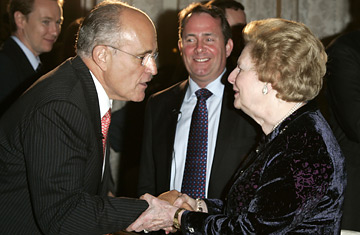
Rudy Giuliani with former British Prime Minister Margaret Thatcher in London
For Americans living abroad, participating in U.S. politics was once as difficult as getting a non-American boss to give them Thanksgiving off. But savvy campaigns recognize the vitality — and deep pockets — of Americans living abroad and are changing their approach, particularly in London.
Over the past two years, eight presidential hopefuls have met with their American constituents in London. On Sept. 19, former New York City mayor Rudy Giuliani made a high-profile visit to the British capital. He met former Prime Minister Tony Blair and current Prime Minister Gordon Brown and gave the Margaret Thatcher Inaugural lecture at the annual Atlantic Bridge dinner, a powerful transatlantic network of conservatives. He also answered questions posed by Winston Churchill's granddaughter, Celia Sandys, during a seated luncheon for ninety campaign donors at the Mandarin Oriental hotel.
Two weeks later, former President Bill Clinton attended a campaign fund-raiser for his wife Hillary hosted by an American couple at their home in the grounds of Windsor Great Park, five thousand acres of protected woodland and historic homes owned by the Queen that once served as royal hunting grounds. Over one hundred guests sipped mojitos and ate canapés while Clinton spoke for an hour and a half. The trip coincided with the promotion of his new book. And on Oct. 15, Michelle Obama, wife of Democratic candidate Barack Obama, attended a campaign fund-raiser packed with almost 200 supporters at the Landmark hotel in central London.
Fund-raising abroad is on the increase. According to Federal Election Commission (FEC) data provided to TIME, by Sept. 15, 2003 — just over a year before the 2004 election — Americans abroad had contributed $650,000 to presidential candidates. By the same time in this cycle, overseas donors have contributed three times as much. The greatest growth is in London, where donations have increased tenfold since 2004 to $450,000 — one-fourth of all the money raised abroad this year. Obama has been the most successful, out-raising Clinton 3 to 1 and Giuliani 2 to 1.
The size and wealth of the expat community in London stems from this city's status as the financial capital of Europe, if not the world. The most recent IRS report on expatriates indicates that there were 300,000 U.S. taxpayers living in the United Kingdom — more than six times the number of Americans living in Japan, the next largest pool of Americans abroad. According to the report, the number of tax returns from the U.K. increased by 40% since the previous report in 1996. The IRS also reported that the average salary of an American living in the U.K. in 2001 was $120,000 — significantly higher than the average U.S. income.
But while campaigns have caught on to the power of American money abroad, the FEC isn't making it easy to count. Since the FEC's forms are not designed to accommodate foreign addresses, all of its international giving data — including the figures cited in this story — may far underestimate just how much campaign money is coming from abroad. All donors to U.S. campaigns are required by law to provide their city, state and zip code, but the FEC form does not have a space for country of residence, let alone foreign postal codes. As a result, donors living abroad are left not knowing what to write; some leave the forms completely blank or fill in "City" (Paris, for example) but leave the "State" field blank. Additionally, hundreds if not thousands of donors who live, work and pay taxes overseas — even for a decade or more — attribute their donation to second home or work addresses in the U.S. — leaving millions of dollars that are actually from overseas unaccounted for. One of the reasons the Obama campaign may appear to have done so well raising money overseas is that his campaign took the initiative to bypass the FEC reporting format and ask online donors to identify their country of residence.
Massie Ritch, Communications Director at the Center for Responsive Politics says, "The money from abroad has escalated faster than the FEC can keep up with. It is a lot more than a lot of states have produced — Iowa has given about as much as we were able to find overseas. The bulk of it is coming out of London. It may be that this is something the FEC has not thought of and they need to revise their reporting forms." A spokesman for the FEC, however, says it has no plans to modify how it gathers and reports donations from Americans abroad. As the election season intensifies, so will the money from abroad — but just how much, we may never know.
